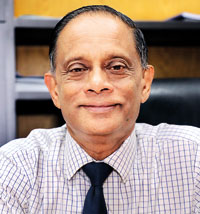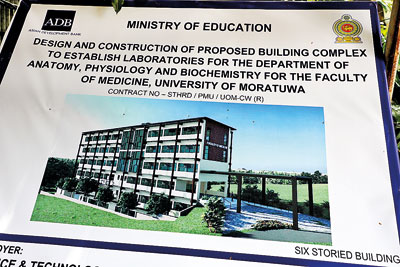News
Moratuwa uni aims to nurture grads equipped with medical technologies
View(s):By Nathara Abeywickrema
The first batch of 104 students, from the Faculty of Medicine (FOM) at the University of Moratuwa (UOM) will begin its final year of professorial clinical training in January 2025.
Following this, they will sit for the bachelor of medicine (MBBS) exam, mandated for all local medical faculties, in mid to late 2026.
The university hosts four student batches of 407 students.

Prof. Ranil Fernando
The Dean of the Faculty of Medicine (FOM) Professor Ranil Fernando is optimistic regarding the educational achievements following the transfer of the South Asian Institute of Technology and Medicine (SAITM) and the Neville Fernando Teaching Hospital (NFTH) to the university’s Faculty of Medicine in August.
In 2020, it became the first such faculty in the country to be set up after the publication of the gazette on minimum standards in medical education, to address the growing need for medical professionals and to foster cutting-edge research and technology in the biomedical sciences and medicine.
He said professorial teaching units being set up by July/ August 2024 was essential in time for the first batch to begin its final year of professorial clinical training mid-2025.
The development plan of Kalutara was devised before the university’s medical faculty was thought of, hence provisions were not made for professorial units at Kalutara District General Hospital, Prof. Fernando said.
The newly-built obstetrics and gynaecology (OB/GYN) and paediatrics units at Gallassa, Kalutara do not have room for professorial units of the university’s medical faculty. Thus, the most logical solution is to start all professorial units of the university at NFTH as it is a purpose built facility, he said.
The professorial teaching facility prepares students to work as competent healthcare providers as house officers in a clinical care setting as soon as they graduate.
Prof. Fernando said, the decision
to transfer the SAITM and NFTH premises to the university was made, and the faculty hosts free clinics for surgery and medicine.
In a meeting with Ministry of
Health officials on July 8, an expert
committee was formed to create the working model at NFTH by August. This is still in progress.
“When the faculty is transferred to the SAITM, a portion of it including the departments of clinical medicine and para clinical sciences will be housed at the SAITM. We hope to obtain the SAITM premises by August, although there are still some financial transactions and related negotiations continuing at this time,’’ said Prof. Fernando.
As yet, the first and second years of students will be at the university, where they will learn the fundamentals; the third and fourth years at Kalutara District Hospital, where they will continue with clinical work and lectures at the Open University in Kalutara; and the fifth and final year will be at NFTH, which is the professorial year.
After three-and-a-half years of working without as much as a brick, the pre-clinical departments’ building, supported by the Asian Development Bank, is being built.
This will be challenging due to issues such as political unrest, the economic crisis, and coronavirus disease pandemic, Prof Fernando said. Yet, all activities, including assignments and examinations, are proceeding as planned.

At the moment, recruitment of academic and non academic staff is suspended due to strike action.
Prof Fernando said there is an
urgent need for a national policy and a coordinated plan for medical education in the country. It fundamentally concerns supply and demand, necessitating a comprehensive reevaluation of the entire process.
Known historically for its excellence in technology and engineering disciplines, the university now faces scrutiny over the relevance and necessity of its Faculty of Medical Sciences.
Advocates argue that focusing on
technology aligns with the university’s established strengths, maximising its impact in specialised fields. They emphasise the potential to consolidate resources, fostering deeper expertise and competitive advantage.
However, Prof. Fernando presents a contrasting perspective, advocating for an inclusive approach to education that embraces technological advancements. In an era characterised by rapid technological progress, the integration of technology into medical education is not merely desirable but essential.
He points out that modern medical practice increasingly relies on technological innovations, from digital diagnostics to robotic surgeries. Therefore, incorporating these advancements into the curriculum is crucial.
The evolution of medical sciences requires a dynamic curriculum that adapts to emerging trends. This evolution is not about abandoning tradition but rather improving it with contemporary tools and methodologies.
By integrating technology into medical education, universities can equip students with the skills and knowledge needed to thrive in a digitally driven healthcare landscape, Prof. Fernando believes.
He said the convergence of technology and medical sciences offers unparalleled opportunities for interdisciplinary
collaboration. Researchers can leverage data analytics, artificial intelligence, and virtual reality to innovate in diagnostics, treatment modalities, and patient care. Such advancements not only improve the quality of healthcare delivery but also contribute to groundbreaking
discoveries and advancements in
medical research.
The best way to say that you found the home of your dreams is by finding it on Hitad.lk. We have listings for apartments for sale or rent in Sri Lanka, no matter what locale you're looking for! Whether you live in Colombo, Galle, Kandy, Matara, Jaffna and more - we've got them all!

